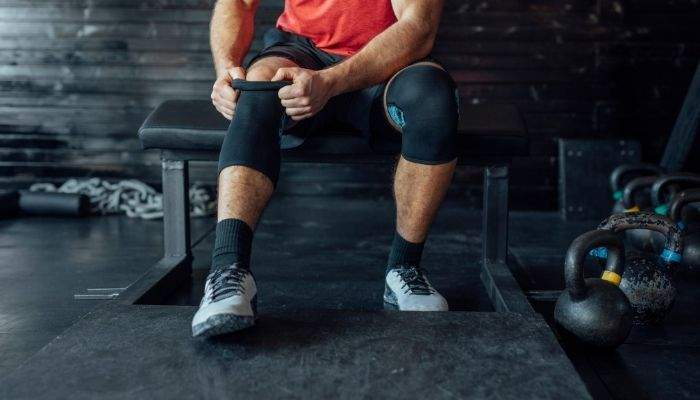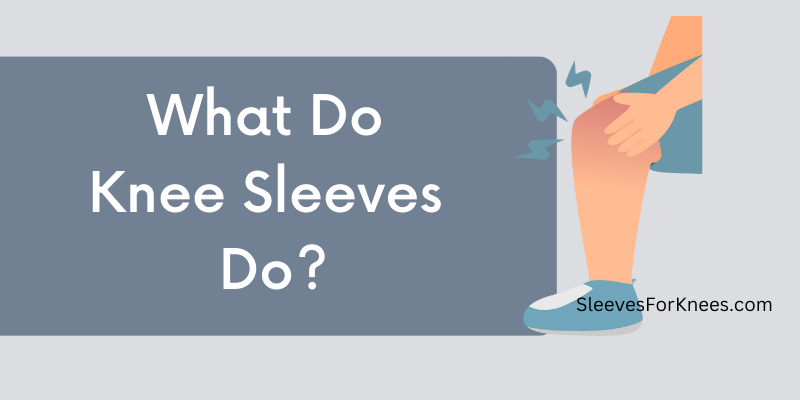If you’re an active person, you know that knee pain and discomfort can be a real setback. Whether you’re a weightlifter, runner, or enjoy high-intensity interval training, knee sleeves can be an effective tool in preventing and reducing pain. Knee sleeves are a common accessory in the world of fitness and are often used to provide support, stability, and protection to the knee joint. But what exactly do they do, and how can they benefit your workout routine? In this post, we’ll explore the benefits of knee sleeves and how they can help you achieve your fitness goals.
Knee compression Sleeves naturally:
- Add stability to the joint
- Limit patella (kneecap) movement
- Increase proprioception
- Aid in faster recovery from injuries and exercise or workouts
- Make staying active on troublesome knees easy
As we delve into each of these knee sleeve benefits you’ll see why so many people of all walks of life are wearing them.
What Do Knee Sleeves Do?
This is an ingenious device, known as a knee sleeve because of the way it is slipped onto the leg and over the knee like a sleeve. It is made of lightweight materials such as neoprene, nylon, or drytex and fits snugly around the knee without adding any bulk.

These elastic sleeves are worn to provide gentle compression and a little extra support to the area around the knee, as opposed to more deluxe knee braces, which are worn to provide more firm support to the knee.
Compression Knee sleeves are available in a variety of sizes and designs to accommodate a variety of needs. Thy are worn on sports fields, gyms, marathons, and walking tracks just to name a few.
1. Knee Sleeves Add Support and Stability In Stressful Activities
Here are 3 different applications for wearing knee sleeves when a little extra support can go a long way:
- Weight lifting
- Sports and other activities that put extra stress on knees
- Injured, recovering, and arthritic knees
— Weight Lifting
Powerlifters and weightlifters, in particular, use stiff and rigid sleeves to stabilize the knee joints while under heavy loads during training and competition.
Face it, your knees were specifically designed to carry the weight of your upper body. When you load them with the extraordinary amounts of weight involved in weightlifting, the stress is tremendous.
Among other benefits, compression knee sleeves help support the knee by holding the knee joints, muscles, tendons, and ligaments in line and maintaining the support needed to avoid injury.
This added support is a great advantage to keeping your knees safe when involved in doing squats, snatch, and the clean and jerk.
— Sports and high stress physical activities
Most sports put tremendous pressure on knee joints as they are forced to make violent, sudden, and unnatural twists and turns.
Athletes depend on knee sleeves for added stability, improving performance, and preventing injuries. They protect the joints from injury when taking misplaced or wrong steps, along with helping to regain control quickly.
The compression factor tends to increase blood flow to the area which provides a gentle warming effect. Knee sleeves keep the joints in action and strong longer as they tire.
— Weak and arthritic knees
Injured, arthritic, and recovering knees from exercise are usually sore and create a sensation of being unstable.
Knee sleeves’ compression and gentle tightness provide much-needed support and confidence that your knees will not buckle under the strain of your weight.
They provide a sturdy, stable, and steady joint for people with arthritic, sore, and weak knees to keep active when it seems impossible without them.
2. Knee Sleeves Can Minimize Stress on Knee Caps
One of the major problems athletes face in their careers is having to deal with knee injuries. Torn cartilage, blown ACLs, MCLs, and PCLs can make athletes stop doing what they love for long periods of time to recover from injuries.
Knee sleeves hold the patella — kneecap — in place during any active use that’s putting stress on your knees.
Whether you’re running, playing basketball, soccer, CrossFit, powerlifting, or bodybuilding you want to limit the patella movement to avoid injury.
Compression sleeves are mechanical supports for knee joints designed to hold the knee cap in place and add an extra layer of protection as it is put through many abnormal and stressful movements.
3. Knee Sleeves Stabilize and Support Weak Knee Joints
Knee sleeves take the worry out of possible knee injuries when you’re putting extra stress on them during exercise or competition of any kind.
Knees are the most vulnerable joint we have even with no extra stress involved. They not only bear our body weight, but must endure the constant twisting and turning motions from normal walking and movement.
When we add sports and exercise to the mix the risk of injury multiplies many times.
Whether you’re engaged in any sports, workout, or exercise activities with weak or injured knees, compression sleeves can definitely help stabilize and support your legs and body.
Not only that bu the added support will give you a heightened sense of balance even on injured knees.
4. Knee Sleeves Improves Healing and Exercise Recovery
Compression knee sleeves tend to cause added blood circulation to the area which in turn warms your knee joints.
This added blood circulation and warmth
- Helps the healing process
- Speeds recovery time from working out and exercise
- Aides in keeping the joints lubricated
Knee injuries are the most prevalent injuries among athletes in most sports.
Unfortunately, sometimes athletes may never be able to play again if their injuries are not handled and treated properly and given enough recovery time.
That is why athletes and sports and fitness enthusiasts think of ways they can prevent injuries from happening. One common solution is to wear a hard brace for injury prevention; however, hard braces have a number of disadvantages.
Braces limit knee mobility along with preventing joints from becoming stronger. That is why, for athletes who want to protect themselves from knee injuries without compromise, wearing knee sleeves is often their best option.
5. Knee Sleeves Make Staying Active on Troublesome Knees Easy
Knee sleeves can significantly enhance the ease of staying active for individuals with troublesome knees because they are made to provide support, stability, and pain relief.
Because they are designed to snugly wrap around the knee joint, offering gentle compression and improved blood circulation you can get a smoother movement with no or much less pain.
Because knee sleeves help to reinforce proprioception – the body’s ability to sense its position and movements – you can experience improved coordination and stability during physical activities and merely walking.
The best sleeves are anatomically shaped to prevent injuries and provide a comfortable and pleasing fit. You’ll find them great for all seasons, wet or dry, and used both indoors and outdoors.
Depending on the brand and model you choose, most are designed for specific uses, such as recovery and rehab, running, walking, hiking, weight lifting, bicycling, basketball, and more.
Wrapping It All Up
In conclusion, knee sleeves serve as a valuable aid for anyone seeking to improve knee joint health, enhance athletic performance, or maintain an active lifestyle despite knee-related challenges.
By providing crucial support, stability, and compression, these simple devices can not only alleviate pain and reduce inflammation but also aide with proprioception and injury prevention.
Whether you are an athlete striving for peak performance or someone looking to stay active and comfortable during daily activities, investing in a quality knee sleeve could be a game-changer.
As you navigate through all the available options, remember to consider factors such as fit, material, and reviews to find the perfect knee sleeve for your own unique needs and budget.
image sources
- What Do Knee Sleeves Do: canva
